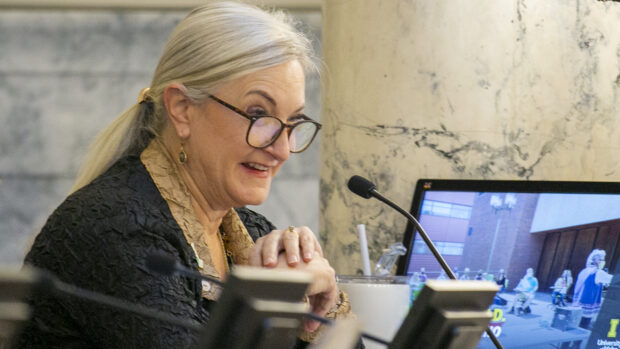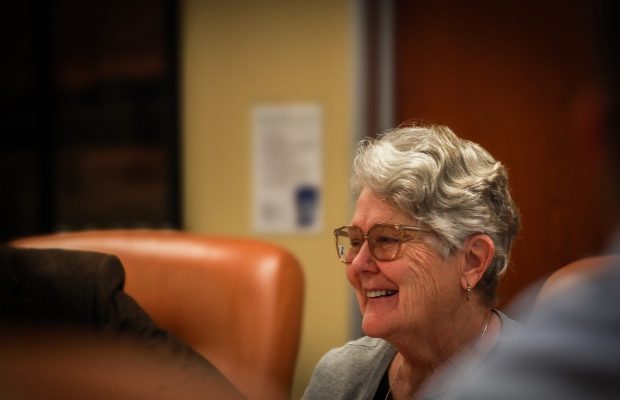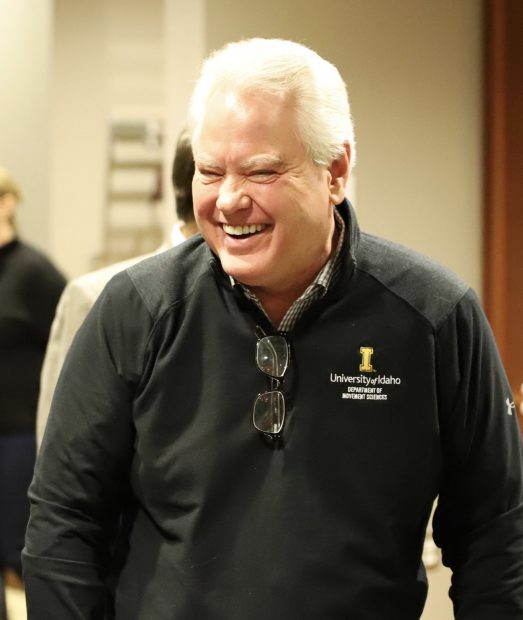(EDITOR’S NOTE: This is the latest installment in Idaho Education News’ ongoing, in-depth coverage of the University of Idaho’s proposed purchase of the University of Phoenix. Over several months, senior reporter Kevin Richert has requested and read thousands of pages of court filings and public records pertaining to the proposal, and has conducted dozens of interviews with supporters and opponents of the purchase.)
When the news broke that the University of Idaho wanted to buy the University of Phoenix, the emails poured in to the State Board of Education.
From U of I sociology professor Leontina Hormel, who called the hasty proposal a violation of trust and a blow to campus morale.
From Jennifer Hood, a Phoenix alum who said she wasted two years and squandered $60,000 on a master’s degree she considers worthless.
From Galen Schuler, an attorney and the son of a college president, who said the state leaders rushing the deal should not treat Idahoans “like bumpkins who ‘wouldn’t understand.’”
From Scott Fehrenbacher, who said his administrative experience at another for-profit university gave him an up-close look at Phoenix’s aggressive recruiting practices and dismal academic performance.
These four people, and others, urged the State Board of Education to slow down — or vote no.
They were denied.
On May 18, just one day after the proposal went public, the State Board gave the $658 million deal its unanimous approval, after only 90 minutes of discussion.
In their rush to sign on — ahead of a May 19 deadline from Phoenix and its accrediting body — board members didn’t even take public comment on, arguably, the biggest and most polarizing higher education transaction in Idaho’s 133-year history. Staffers forwarded public emails to board members at about 8 a.m. on May 18, five hours before their meeting. At that meeting, then-board President Kurt Liebich acknowledged that the board had heard from opponents, who criticized Phoenix’s record and said faculty and the public had been cut out of the process.
Seven months later, those same criticisms linger.
People like Hormel, Hood, Schuler and Fehrenbacher still have questions about the Phoenix purchase. They say state and U of I leaders didn’t listen to them then, and aren’t listening now.
“Lord knows the State Board of Education didn’t give a diddly whoop,” said Joseph Wright, a Boise resident who emailed the board the morning of May 18, calling the Phoenix purchase “a disaster in the making.”
Emails to and from the State Board offer a candid, unflinching look into the 24 hours leading up to a decision that could promise tens of millions of dollars to the state’s land-grant institution — or place taxpayer dollars at risk. They provide a prelude into a debate that continues today.
They also provide a record of what some of Idaho’s most prominent education leaders said and did, behind the scenes, on May 17 and 18.
‘Our authority will be strongly questioned’
About this story: Idaho Education News reviewed emails to and from State Board of Education members, obtained through a public records request. The emails provide a narrative of the 24 hours leading up to the State Board’s approval of the University of Phoenix purchase. EdNews then emailed the 27 people who emailed the State Board on May 17 and 18, conducting interviews and receiving email replies from 14 respondents. The State Board declined comment for this story, and University of Idaho President C. Scott Green refused repeated interview requests.
As the State Board hastily arranged a May 18 public meeting to vote on the Phoenix purchase, state leaders raced to get out ahead of the breaking news.
State Board and U of I officials and an aide to Gov. Brad Little briefed legislative leaders and congressional staffs the morning of May 17.

Caroline Nilsson Troy, a former legislator who now serves as U of I’s lobbyist, wrote university President C. Scott Green early in the afternoon with the summary. Lawmakers pressed for details — about the makeup of the nonprofit board that would oversee Phoenix; about whether the board had the authority to bond for the purchase; and the business plan for a partnership between the state’s oldest public university and a for-profit online upstart.
Troy also wrote up a list of “general comments and observations,” also running a wide gamut. One nodded to the president’s nontraditional background as a business executive: “Only Scott Green could pull this off.” Another was an unveiled warning to the U of I, and a State Board poised to approve the purchase: “Although the Idaho Legislature has ‘no involvement,’ it doesn’t mean it won’t get involved.”

Early in the evening, State Board Executive Director Matt Freeman emailed Green. Without naming names, Freeman made it clear that lawmakers were not in lockstep. “Overall, the calls were positive, with one notable exception.”
About an hour later, State Board member Linda Clark offered a succinct read on the briefings. “Lots and lots of questions,” she said in an email to Liebich. “Our authority will be strongly questioned.”
‘This is not a reputation the University of Idaho should want to take on’
By the evening of May 17, Christopher Birkinbine took his concerns to Green directly.
A 2013 graduate with a degree in physics, Birkinbine wrote that his U of I education allowed him to rise to a project manager’s position at NASA. “I have been proud to display my Joe Vandal stickers and coffee cups and discuss the merits of an Idaho state school education in science.”
But he also said he was “incredibly disheartened” by the day’s news, echoing a criticism expressed by Phoenix alum Hood and others: Ultimately, Phoenix’s degrees have no value in the marketplace.
“I have spoken to numerous industry partners who won’t even consider graduates of the University of Phoenix unless they have real-world experience in industry first. This is not a reputation the University of Idaho should want to take on.”
At 6:22 a.m. on May 18, Green responded personally. The reply took on many of the hallmarks of the U of I’s messaging on Phoenix: He defended the due diligence leading up to the purchase, and touted the potential for the state. “There are many benefits of this affiliation for the university and the state, world-class systems and the ability to reach our place-bound, rural students are just a couple examples. We hope you will soon hear stories of their success.”
Green — a U of I alumnus, like Birkinbine — closed his email with a quick signoff: “Go Vandals!”
The Vandal community responds
Other emails came from across the U of I orbit — blasting a process that caught faculty off guard, and questioning the promise of new revenues.
- “We have an excellent track record of preparing our undergraduate and graduate students for a range of jobs,” acting English department chair Alexandra Teague wrote. “This acquisition of University of Phoenix demeans this hard work that we all do to maintain UI’s reputation and serve our students.”
- “It may be the right move to acquire Phoenix, or it may not — it’s too early to tell,” wrote Michael McGriff, an associate professor of English. “But I certainly feel patently overlooked and underrepresented concerning these matters. Does shared and democratic government only apply when it’s convenient?”
- “Do not waste public monies on (the) purchase of a useless university that produces useless degrees,” said Richard Huffman, a 1977 graduate.
- “Phoenix is looking for a buyout — and legitimacy,” said research scientist Erich Seamon. “UI wants to sacrifice its reputation for a scheme it thinks can make money.”
- “Even if it makes us money (which is far from assured), the relationship will at best be an exploitative one, built on the backs of (Phoenix)’s adjuncts and working-class students,” wrote Ashley Kerr, an associate professor of Spanish and Latin American studies.
But one voice of support — and the only email the State Board received in favor of the proposal — also came from a faculty member. Alistair Smith, chair of the U of I’s earth and spatial sciences department, called the acquisition a “very bold move.”
“For years, there has been a realization at many of our state institutions that Idaho is not keeping up with online education,” he wrote. “(This proposal) has enormous potential to better meet the needs of Idahoans, especially those in rural areas where travel to institutions may not be financially desirable.”
Contacted by EdNews, Smith declined to elaborate.
‘We have a great board’
On the morning of May 18, Green also heard from a colleague: Donald Bobbitt, president of the University of Arkansas. A month earlier, Bobbitt had been rebuffed in his bid to acquire Phoenix, when his board of trustees narrowly voted to reject the deal. While Arkansas trustees publicly rejected Phoenix, Idaho’s State Board was actively and privately looking at Phoenix — unbeknownst to almost everyone in Idaho.
“You and your board were able to accomplish what I could not,” Bobbitt wrote.
With the State Board’s meeting still a few hours away, Green stopped short of taking a victory lap.
“It is not done yet, but we have a great board. I understand how difficult it is to get a complex deal like this structured and done, and am sympathetic to all you had to deal with. We certainly learned from your hard work.”
Lingering questions — and silence
The opponents who contacted the State Board in May haven’t changed their minds. More than a dozen responded to Idaho EdNews in November and December. Schuler — an attorney, now living in Boise — gave the U of I some credit for addressing questions about the potential risk to taxpayers, but said he still has questions about whether the deal will work. “It’s hard to argue with lots of money, I guess, as long as it keeps coming.”

And the opponents aren’t just set in their opposition. Several aren’t happy with the process — and a lack of response from the State Board or the university.
Fehrenbacher said his letter to Green went unanswered. And he had thought he might have an in. In 1980, he was the U of I’s student body president. From 2008 to 2015, he worked for Grand Canyon University — a for-profit university that was in growth mode. Grand Canyon hired many key staffers from Phoenix, which was then closing campuses, hemorrhaging enrollment and shedding employees.
“I thought with the unique experience I had, that I would be able to at least get a modest response from the president’s office,” he said in a recent interview. “It’s not about me. … I’m not sure if anyone around President Green is giving him accurate counsel.”
As the $685 million deal nears a potential closure, perhaps early in 2024, answers from those closest to the transaction are hard to come by.
Clark, now the State Board’s president, declined an EdNews interview request. Through a spokesman, Clark cited an ongoing lawsuit filed by Attorney General Raúl Labrador, which says the State Board violated open meetings law when it discussed the Phoenix purchase behind closed doors in March, April and May. The lawsuit goes to trial in January, and could jeopardize the purchase.
Green refused EdNews’ repeated interview requests; U of I spokeswoman Jodi Walker said Green had no time in December for an interview. But on Dec. 11, Green went to the U of I’s Idaho Water Center in Boise, to sign copies of a book he co-authored on campus crisis management. He would not speak to an EdNews reporter who came to the event.
More coverage: ‘The dollar store of higher education:’ Skeptics say the Phoenix purchase would cheapen the U of I brand.
